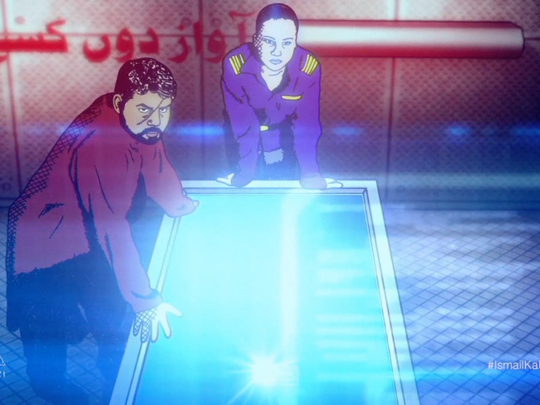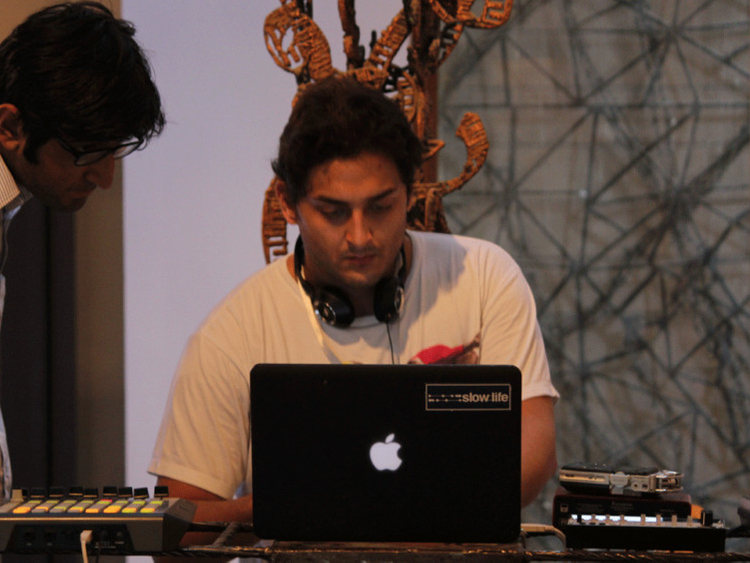
As the hall grows dark and a screen lights up with a kaleidoscope of dancing symbols, a range of electronic sounds echo eerily. There’s a distinct futuristic feel and you’re sucked into a vortex of graphic images, a love story from another planet, an apocalyptic world run by supervillains and, disturbingly, another reminder of where Earth could be heading.
But as the poetry, which mulls over death and the physical pains of love, melds into Sara Haider’s enchanting voice, Death of Mehr-un-Nisa takes on fantastic meanings, one of which suggesting Pakistani electronic music is here to stay.
The song is one of 14 tracks on Zohaib Kazi’s Ismail ka Urdu Sheher, an ambitious album-cum-graphic novel. Each track corresponds to a chapter and tells the story of Ismail Alset, a scientist from a distant planet who embarks on a journey to reverse the effects of an experiment on Earth gone wrong.
“Technology, futurism and physics are my primary fields of interest these days,” Kazi, who is also General Manager and Associate Producer of the acclaimed music show Coke Studio Pakistan, tells GN Focus.
“The intent was to entertain audiences while educating them about alienated concepts.
“My next step is to get the product translated in Urdu so that coming generations grow aware of subjects such as science, astronomy and philosophy and literature — Urdu literature — evolves in order to keep up with new science and people develop interest.”
Vibrant scene
Bold, avant-garde, innovative and passionate are some words that describe the electronica scene in Pakistan today, with numerous artists and producers creating spectacular, idiosyncratic music. All of it has developed underground, considering the geopolitical reality.
“The underground is a lot more vibrant than the audience can imagine and every city has its own distinct sound,” says Haamid Rahim, who records music as Dynoman.
He started the Forever South (FXS) collective with drummer Bilal Nasir Khan. “When FXS originally started in 2012, we were the only ones doing shows or performances for a while. Now there are many crews doing great things to keep the spirit of the underground alive.
“Pakistani electronica is quite heavy on the internet and all electronica lovers will be super happy when they unearth Pakistan’s hidden gems such as Black Peach Project, Faisal Baig, Bilal Brohi, Fuzzy Nocturnal, Saad Memon, Fake Shamans, Altered States, Saulat Qadri, Nawksh and Slowspin.”
The latter, aka Zeerak Ahmed, is perhaps the most prominent female producer/vocalist/songwriter at the moment. Blessed with a hypnotic voice, she is a mixed media sound and performance artist with several EPs to her credit. And this artistic fluidity drives her work. “A part of my art practice is that I map spaces with different mediums, one of them is sound,” she told Elevtrtrax, a US-based culture blog.
“So I mediate in taped circles in different places and get to have [their] documented images of what those shapes were... than what those sounds were.
“Soulspins [her latest album] has raw tracks from the airport, guitars and vocals — there’s no other tempering.”
Deeply personal
The sheer range of talent is astonishing and the songs are intensely personal, perhaps because they reflect unspoken dreams and desires. Each song, SoundCloud album or EP also feels like a personal revolution in a way.
“The underground electronica scene survived through the terror-struck times and musicians discovered the endless possibilities of their own space, with minimal set-up requirements, performing for their niche audience,” says Kazi. “I think the highest number of electronica concerts in Karachi happened in 2013-14, when anything that could go wrong went wrong. But the cluster was creating and performing music despite it.
“The current scene is at a tipping point. With no system in place and no monetary motivation, what’s happening is true art. There are no rules or norms to follow, so there’s a certain sense of creative freedom.”
Kazi is working on a new album, Fanoos, which is partially recorded, while FXS is making waves with its #hotcues series, which is a single biweekly accompanied by visual art. The platform will also release new tracks and LPs by Rahim as well as recent sign-ons Abdullah Siddiqui and Hatim Siddique, a bunch of other singles and EPs.
“The community has spread far and wide and we’re all linked with other forms of art in Pakistan,” says Rahim. “Many of us have done projects in Karachi’s experimental performance art scene and are constantly on the lookout for new talent.”
Are you listening?









